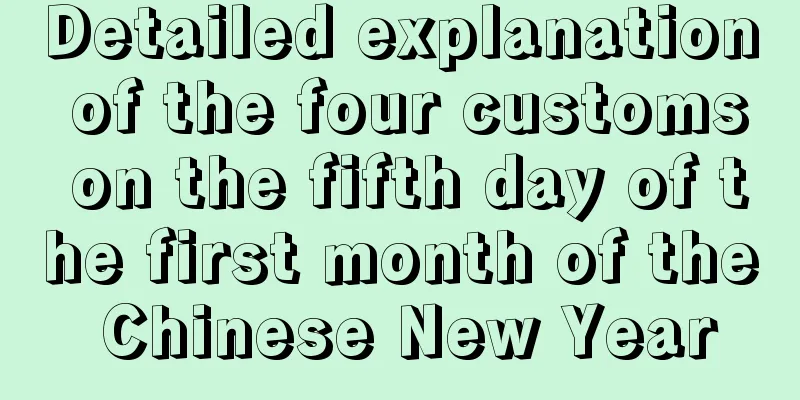Detailed explanation of the four customs on the fifth day of the first month of the Chinese New Year

Introduction: According to my country's traditional folk customs, there are many customs from the first to the fourth day of the first lunar month. After the fifth day, all customs and taboos can be broken, so the fifth day of the first lunar month is also commonly known as "Po Wu". Therefore, there are many customs on this day. Next, the editor will analyze the four major customs of the fifth day of the Lunar New Year. What are these four major customs? Let’s find out together! A year's plan begins with spring, and the Spring Festival is an important traditional festival of ours. Do you want to know more about the Spring Festival? Come and take a look at the Spring Festival special topic carefully prepared by Mr. Shui Mo!Custom 1: Offering sacrifices to the God of WealthOffering sacrifices to the God of Wealth is not only a tradition in the south, but also in many places in northern my country, sacrifices are offered to the God of Wealth on the fifth day of the first lunar month. According to folklore, the God of Wealth is also known as the Five-Road God, namely the household god, kitchen god, earth god, door god and travel god. The so-called five roads refer to the east, west, south, north and center, meaning that you can make money by going out of any of the five roads. Therefore, every Chinese New Year, people open the doors and windows, burn incense, set off firecrackers, and light fireworks at midnight on the fifth day of the first lunar month to welcome the God of Wealth. After receiving the God of Wealth, everyone has to have a road-opening wine feast, which often lasts until dawn. Everyone is full of hope of getting rich, hoping that the God of Wealth can bring gold, silver and treasures to their homes and make them rich in the new year.Custom 2: Sending away poverty"Sending away poverty" on the fifth day of the first lunar month is a very distinctive seasonal custom among the ancient Chinese people. The meaning is to sacrifice to the poor ghost (the god of poverty). There are many nicknames for sending away the poor, such as "sending away the five poor", "driving away the five poor", "sending away the poor soil" and "sending away the poor clothes". Folk customs believe that if you don't throw away garbage from New Year's Day to the fifth day of the New Year, you will be able to gather wealth, otherwise you will lose your "good fortune". However, too much garbage pile up affects hygiene after all, so it must be thrown out on the fifth day of the New Year, and there is a custom to do so, which is called "sending away poverty." There are many ways to get rid of poverty. The simplest way is to just dump the garbage out of the door with firecrackers in the early morning; the more complicated ones are to cut a little paper figure (the poor daughter-in-law) and send her away, or even let her carry a paper bag filled with garbage and deliver it to the door; there are also those who eat a full meal or fill a jar with water on the fifth day of the New Year, which is called "filling the poverty", or take the "poor daughter-in-law" from someone else's house away, which is called "getting rich".Custom 3: CleaningOn the fifth day of the Lunar New Year, people get up at dawn, set off firecrackers and clean the house. Cleaning is a thorough housecleaning. Sweep the rubbish out of every house. From the 30th day of the 12th lunar month to the 5th day of the 1st lunar month, cleaning is generally not allowed. You can sweep the floor, but only inside the house, and the garbage can only be placed in the corner of the house. Especially on the first day of the Lunar New Year, not even a broom can be moved, as it is said that if you move it, the good luck will be gone. But on the fifth day of the New Year, you have to do a thorough cleaning. When the garbage was swept out of the door and into a corner, the firecrackers were moved outside the house. Then a huge firecracker was taken, placed on the garbage pile, and lit. With a bang, the ceremony was over. People said: Now, all the poor and needy people have been driven away! So let’s eat.Custom 4: Welcoming the Road GodLu Tou is also known as the "Five Road Gods". It is said that at the end of the Yuan Dynasty, there was a He Wulu who died in the fight against foreign invaders. People therefore worshipped him as a god and named him "Wulu God". But this Five Roads God seems to have nothing to do with the Five Roads Gods of Lu Tou, who is the God of Wealth. Some people believe that the Five Road Gods are actually the Five Holy Gods, or the Five Tong Gods. After Tang Bin destroyed the Wutong Temple on Shangfang Mountain during the reign of Emperor Kangxi, people did not dare to worship the Wutong God, so they changed its name to Lu Tou and worshiped it. This road is generally regarded as the traveling god among the five ancient sacrifices. The so-called five roads are east, west, south, north and center. All wealth and goods travel by road, so people regard the traveling god as the god of wealth and worship him carefully, hoping that he will bring money into the house or make a profit when traveling. In ancient times, when people traveled, they would offer sacrifices to the road god in order to pray for safety. This was the custom of "Zudao". In the Wu custom, when people met someone on the road, they also offered sacrifices to the road god, and this road god became the god of wealth. It is commonly believed that the earlier you receive the road head, the better. The first one to receive it is the true god and is particularly effective, hence it is called "抢路头". In some places, people really "rush to get ahead" on the fourth day of the New Year, and it has become a custom. Since the road god was no longer a protector of travelers, people no longer worshipped him when traveling. As for why people worship the God of Roads on the fifth day of the first lunar month and regard this day as his birthday, it is because the "five" among the Five Gods of Roads is related to the "five" in the fifth day of the first lunar month. Summary: The above article provides us with a detailed analysis of the specific customs of the fifth day of the Lunar New Year. You can read it and learn more about our country’s traditional customs and culture!After reading this article, there are more exciting content in the Spring Festival special topic, let’s take a look! |
<<: What day is the fifth day of the Lunar New Year and what are the customs?
>>: What day is the seventh day of the first lunar month and what are the customs and habits?
Recommend
Can I get engaged on the Autumnal Equinox on August 25, 2019? What are the etiquettes for engagement?
Since ancient times, marriage has been very import...
Is March 12th of the lunar calendar 2021 a good day to set up the bed?
Green locust trees and tall willows are swallowing...
Is it a good time to open a store or company on the fifth day of the ninth lunar month in 2017?
It is such a deep autumn, so golden, and so fruit...
Is it a good time to open a new store on August 2, 2017? Is it suitable for a company to open its doors?
The golden autumn is in August. We harvest beauti...
What is the fate of a boy born on October 28th of the lunar calendar in 2019?
What is the fate of a boy born on October 28th of ...
Where is the God of Wealth on the 26th day of the first lunar month in 2018?
1. What day is the 26th day of the first lunar mo...
Which auspicious days are suitable for picking up a new car in September of the lunar calendar in 2020, the Year of the Rat?
Introduction: Every day has its good and bad luck,...
Is the beginning of spring on December 30th, 2019, a suitable date for relocating graves? Does the beginning of spring mean spring?
Introduction: In our country's traditional cul...
Is March 16th of the lunar calendar in 2018 an auspicious day?
Introduction: The lunar calendar can be good or ba...
Is November 27th of the lunar calendar in 2021 an auspicious day? Is it appropriate to install a door there?
The eleventh month of the lunar calendar is coming...
What are the famous people who were born on the eighth day of the first lunar month?
According to folklore, the eighth day of the first...
Is it a good thing to have good luck on Qingming Festival? How to adjust your fortune during the Qingming Festival?
As one of my country's traditional festivals, ...
Is June 22nd of the lunar calendar 2021 suitable for moving? What are the requirements for moving into a new house?
The June sun scorches everything, and the dog days...
Is the 16th day of the seventh lunar month in 2019 a good day to travel far away?
Every day has its good and bad luck, so is July 16...
Can I pray on the second day of the third lunar month in 2021? What should we pay attention to when burning incense to pray for blessings?
In late spring in March, the orioles are singing. ...









